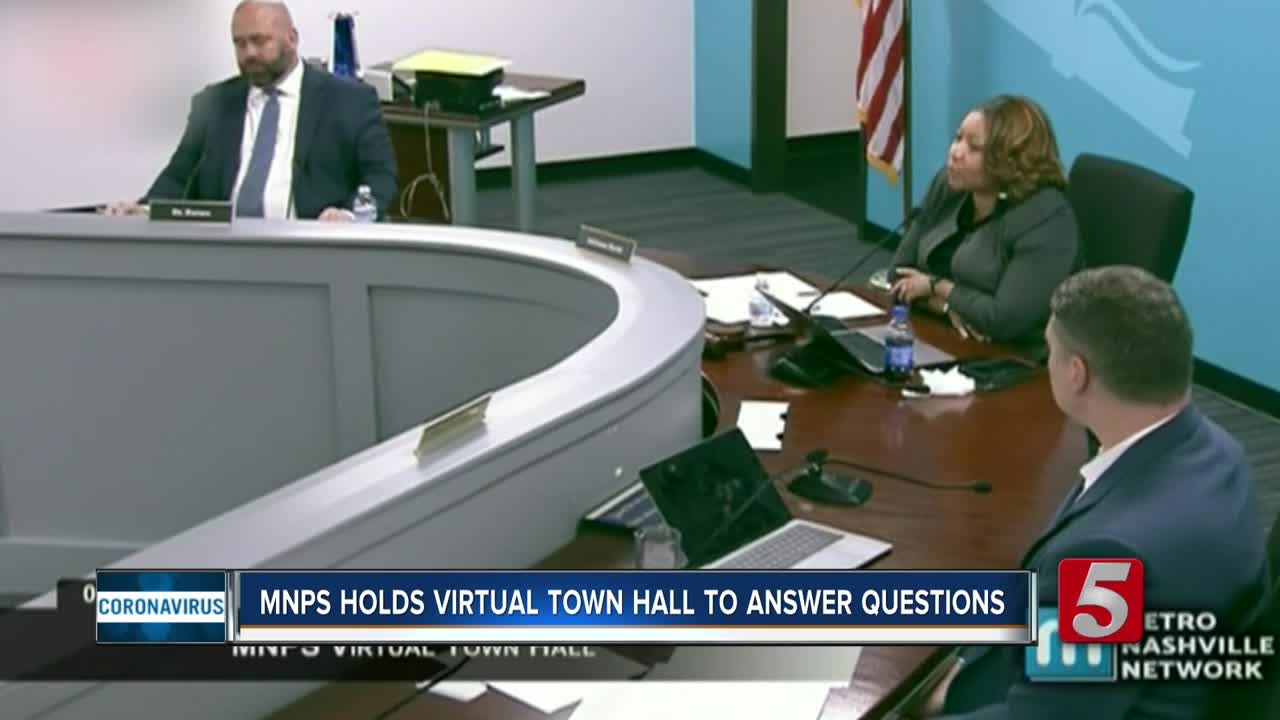NASHVILLE, Tenn. (WTVF) — School systems across Tennessee are scrambling to figure out how to handle classes, grades and graduation while schools are closed during the COVID-19 outbreak.
Leaders from Metro Nashville Public Schools hosted a virtual town hall meeting Monday afternoon in an effort to provide some answers. For about an hour, Director of Schools Dr. Adrienne Battle, Chief Academic Officer Dr. David Williams and Chief of Human Resources Dr. Chris Barnes answered questioned submitted from teachers, students and staff.
“For the last few weeks, we have focused on the immediate needs of students,” said Dr. Battle. “There was not and is not a playbook for unprecedented times like these.”
Metro schools are closed until at least April 24. Dr. Battle said that could be extended, but would not definitively say if the school year was over. Days lost due to the tornado and COVID-19 won’t be made up.
MNPS provided more than 22,000 meals across Davidson County last week, and will continue to offer the service on weekdays when schools are closed. Locations and times can be found at https://www.mnps.org/covid19
Students picking up meals were also provided a packet of learning materials. The district is also providing online materials for students, parents and teachers to download.
District officials are working with high school principals and staff to distribute laptops to students to ensure they graduate on time.
Dr. Battle encouraged students to keep a daily schedule that includes learning, as well as reading at least 30 minutes a day. Teachers are encouraged to reach out to students once or twice a week to help keep them on track.
“This is not a time for us to sit back and not be engaged,” said Dr. Battle. “Students, stay engaged, stay connected. As we roll out opportunities for you to continue to grow, I encourage you to take advantage of these opportunities.”
District officials said they are still waiting on guidance from the state on how to calculate grades and graduations. However, all proms have been canceled due to social distancing recommendations, and ACT testing has been postponed. The Tennessee Board of Education has a meeting scheduled for April 9.
Despite big changes, officials said they want to make sure students aren’t penalized for something they can’t control.
“We are working hard to make sure we have plans to transition students forward into their next grade,” said Dr. David Williams, Chief Academic Officer for MNPS.
MNPS officials may host additional town hall meetings in the future.
To watch the entire town hall meeting visit: https://www.mnps.org/blog/2020/3/30/virtualtownhallmarch30?fbclid=IwAR0NZEmBXDH4SMnFbCpjjQQzCCYyZAQK7iNm67RfqCnfCdlzkg0qWoae2Gs
For more resources for parents, students and teachers, visit: https://www.mnps.org/covid19
MORE TENNESSEE COVID-19 COVERAGE
- Mask mandate, capacity restrictions lifted in Nashville; what you need to know
- Tennessee, Metro to offer COVID-19 vaccine to children 12-15 years old
- Nashville's COVID-19 testing centers to adjust operating hours
- Walmart pharmacies in Tennessee now offering COVID-19 vaccines
- Donate to the COVID-19 Middle Tennessee Emergency Response Fund
See all our coronavirus coverage here
COUNTY-BY-COUNTY CASES IN TENNESSEE
What is COVID-19 (a.k.a. the new coronavirus?)
According to the World Health Organization, coronaviruses (CoV) are a large family of viruses that cause illness ranging from the common cold to more severe diseases. Examples include the Middle East Respiratory Syndrome (MERS-CoV) and Severe Acute Respiratory Syndrome (SARS-CoV). A novel coronavirus (nCoV) is a new strain that has not been previously identified in humans. COVID-19 stands for "Coronavirus disease 2019," which is when this strain of the coronavirus was discovered.
What are the symptoms?
The CDC says patients confirmed to have the 2019-nCoV reportedly had mild to severe respiratory illness with:
- Cough
- Shortness of breath or difficulty breathing
Or at least two of the following symptoms:
- Fever
- Chills
- Repeated shaking with chills
- Muscle pain
- Headache
- Sore throat
- New loss of taste or smell
At this time, the CDC believes symptoms could appear as soon as two days after exposure, or as long as 14 days.
Prevention
The CDC is recommending "common sense" measures such as:
- Wash your hands often with soap and water for at least 20 seconds. If soap and water are not available, use an alcohol-based hand sanitizer.
- Avoid touching your eyes, nose, and mouth with unwashed hands.
- Avoid close contact with people who are sick.
- Stay home when you are sick.
- Cover your mouth and nose with a cloth face cover when around others.
- Cover your cough or sneeze with a tissue, then throw the tissue in the trash.
- Clean and disinfect frequently touched objects and surfaces.



